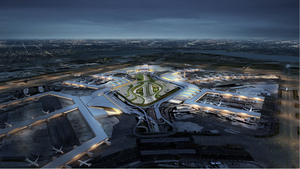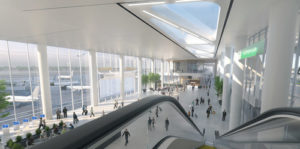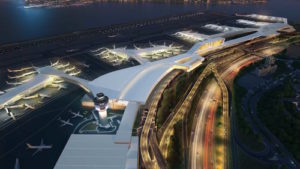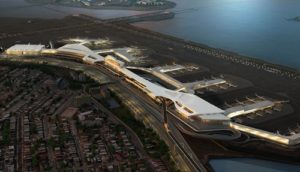
New York Gov. Andrew Cuomo (D) could provide a lesson or two to newly inaugurated President Trump (R), who has vowed to invest heavily in US infrastructure upon assuming office today.
Cuomo has made good on a promise to perform massive upgrades on state infrastructure, with many key projects, including recently announced plans to revamp John F. Kennedy International Airport (JFK), in the planning stages or under way in or around New York City. Furthermore, his administration is endorsing procurement methods ranging from design-build to private-public partnerships (P3) to finance and expedite the sorely needed rebuilds and renovations. In all, Cuomo plans to invest $100 billion in infrastructure throughout New York, his goal being to “cement our state’s position as a national leader in 21st-century infrastructure and cutting-edge innovation,” he said recently.
The $10 billion JFK renovation, announced earlier this month, involves plans to integrate and upgrade three existing terminals, expand parking, and improve access to the facility, located in the borough of Queens. “The goal is to have a unified, interconnected, and modern airport,” Dan Tishman, vice chairman of construction giant AECOM and head of Cuomo’s airport task-planning force, recently told attendees of a lunch hosted by the Association for a Better New York. Funding has yet to finalized, though word is the project may be partly bankrolled by a P3. At the luncheon, Tishman indicated the project could include up to $7 billion in private equity.
Assuming P3 serves as a major funding mechanism, JFK will follow in the footsteps of the current $4 billion, 1.3 million-square-foot rebuild of LaGuardia Airport‘s Central Terminal B, an eight-year project undertaken by the Port Authority of New York and New Jersey in 2016. Chances are that JFK, like LaGuardia, will incorporate design-build, a key component of Cuomo’s 2014 “Build New York” initiative, owing to its potential to “reduce procurement time and cost as well as bring private-sector innovation and efficiency to public-sector projects,” according to a statement by New York State.
Special Delivery: The Port Authority is employing a public-private partnership and design-build to deliver the massive rebuild of LaGuardia Airport. It currently is the the largest P3 in New York. Images from Curbed New York
LaGuardia’s design-build team comprises a who’s who of industry titans, including a joint venture of builders Skanska USA and Walsh Construction, with architect-engineer HOK and engineer WSP/ParsonsBrinckerhoff serving as designers. All are working under the auspices of LaGuardia Gateway Projects, a P3 team led by developers Vantage Airport Group, Skanska USA, and Meridiam. The trio has that signed a 50-year lease of the terminal through 2050.
The rebuild, occurring in Queens, is long overdue, with former US Vice President Joe Biden having compared the existing 53-year old terminal to that of a third-world country. Built in 1964, the terminal was designed to accommodate half the 16 million passengers it annually serves.
In addition to a new Terminal B and a west garage, plans call for a pedestrian bridge connecting the two, the replacement of the facility’s central heating and refrigeration plant, the consolidation of a receiving and warehouse distribution facility, and upgrades to airfield and aircraft taxiways as well as airport roads and utilities.
“The new terminal is vital to the transportation needs of our country, the vibrancy of our economy, and will serve a flying public that is growing significantly,” Skanska USA President and CEO Rich Cavallaro said in a statement. “The project is the largest public-private partnership in New York.”

Along with Related Cos. and Vornado Cos., Skanska USA also has been selected to redevelop Manhattan’s 588,000-square-foot, 105-year-old James Farley Post Office as part of long-awaited renovations to Pennsylvania Station, located across the street from Farley. The development team will execute the $1.6 billion project under a fixed-price design-build contract. In addition to 225,000 square feet of passenger facilities for the Long Island Rail Road (LIRR) and Amtrak, the redubbed Moynihan Train Hall, so named for former New York senator Daniel Patrick Moynihan, will house 112,000 square feet of retail and 588,000 square feet of office space. As planned, the development team, named RVS, will contribute $600 million in funding for the project, with Empire State Development Corp. (ESD) contributing $570 million. The balance will derive from from Amtrak, LIRR, and the Port Authority of New Jersey and New York.
Separate requests for proposals will be issued for the revamp of LIRR and Amtrak facilities in Penn Station, according to Skanska USA spokesman Michael E. Iacovella.
Penn Station, completed in 1968, is North America’s busiest train station, currently serving 650,000 passengers per day—three times the number originally intended. Cuomo hasn’t minced words about Penn’s current condition: “It is dirty, it is dingy, it is dark, … it’s decrepit, and its an affront to riders,” he recently said.
Cuomo made another long-delayed project, the $3.98 billion replacement of Metro New York City’s Tappan Zee Toll Bridge, a particular priority, due the 62-year-old original’s poor condition and the costly succession of costly repairs it has required. Cuomo and state legislators originally considered P3 financing for the twin-span cable-stayed replacement, currently under construction over the Hudson River, about 20 miles north of New York City. Instead, the New York State Thruway Authority is relying on a TIFIA loan and toll revenue bonds to fund the five-year project, which will span Rockland and Westchester Counties upon completion in 2018.
“THE NEW LAGUARDIA AIRPORT IS VITAL TO THE TRANSPORTATION NEEDS OF OUR COUNTRY, THE VIBRANCY OF OUR ECONOMY, AND WILL SERVE A FLYING PUBLIC THAT HAS GROWN DRAMATICALLY.”
A design-build team, Tappan Zee Constructors (TZC), is undertaking execution of the 3.1-mile span, with designer HDR subcontracting to TZC members Fluor, American Bridge, Traylor Bros. Inc., and Granite.
“The key challenge is working over one of the widest points of the Hudson River, covering a distance of 3.1 miles between Rockland and Westchester Counties,” said TZC Spokesman Damien LaVera. The project also has entailed management of some 6,300 workers thus far. Nevertheless, “the bridge is on track to open in 2018, as planned,” LaVera said. “To date, 90 percent of support structures are installed and 3,000 roadway panels to connect the Rockland and Westchester shorelines.”
Cuomo likened the undertaking to others in the works at a topping-out of Tappen Zee in December. “Now, we’re going to build a new LaGuardia Airport,” he said. “Why? Because it’s the same as the old bridge. It was 20 years of failure. Then, we’re going to restore Penn Station. Why? Because it was the same thing. It was 20 years of failure. We believe we can because we are New York.”




Discussion
Be the first to leave a comment.
You must be a member of the BuiltWorlds community to join the discussion.